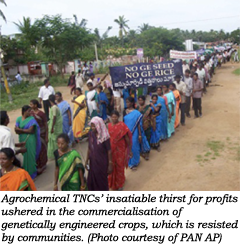The Permanent People’s Tribunal (PPT) Session on Agrochemical Transnational Corporations Case Summary
More profits, more crimes
 Agrochemical TNCs’ insatiable thirst for profits ushered in the commercialisation of genetically engineered (GE) crops. The socalled Gene Revolution has ushered in a new era of even greater suffering, especially for small food producers and traditional seed keepers. Like pesticides, GE crops were introduced to the market through false claims of safety and solving world hunger. But in reality, even bribery has been used to push these highly controversial products. Monsanto, the world’s top seed and biotechnology company, paid hundreds of thousands of dollars to Indonesian government officials from 1997 to 2002 in order to secure the approval of its genetically-engineered Bt cotton.
Agrochemical TNCs’ insatiable thirst for profits ushered in the commercialisation of genetically engineered (GE) crops. The socalled Gene Revolution has ushered in a new era of even greater suffering, especially for small food producers and traditional seed keepers. Like pesticides, GE crops were introduced to the market through false claims of safety and solving world hunger. But in reality, even bribery has been used to push these highly controversial products. Monsanto, the world’s top seed and biotechnology company, paid hundreds of thousands of dollars to Indonesian government officials from 1997 to 2002 in order to secure the approval of its genetically-engineered Bt cotton.
GE crops raise serious safety concerns, as genetic engineering is considered by many scientists as a highly imprecise technology. GE organisms can produce unexpected and unpredictable effects that are potentially harmful or even fatal. Animal studies have shown that the Bt toxins from Bt crops can create “holes” in the intestinal wall, and cause liver damage and reproductive disorders. Among humans, the toxins can adversely affect the immune response, and has been detected in umbilical cord blood.
 Agrochemical TNCs’ claims that GE crops will reduce pesticide use have been proven to be untrue. Herbicide use increased by almost 200 million kilograms over the first 13 years of the commercial use of GE crops in the U.S., with Monsanto’s Roundup Ready soybean accounting for most of the increase. RR soybean is resistant to the toxic herbicide glyphosate, which is being sold by Monsanto along with the seeds. In 2003, Silvino Talavera, an 11-year old Paraguayan, died upon exposure to pesticides used on RR soybeans.
Agrochemical TNCs’ claims that GE crops will reduce pesticide use have been proven to be untrue. Herbicide use increased by almost 200 million kilograms over the first 13 years of the commercial use of GE crops in the U.S., with Monsanto’s Roundup Ready soybean accounting for most of the increase. RR soybean is resistant to the toxic herbicide glyphosate, which is being sold by Monsanto along with the seeds. In 2003, Silvino Talavera, an 11-year old Paraguayan, died upon exposure to pesticides used on RR soybeans.
With the aid of free trade agreements, patents for GE crops are protected under the intellectual property rights of agrochemical TNCs. Globally, corporations have already patented more than 900 rice genes. They use these patents to charge exorbitant fees for GE seeds. Farmers, especially women, used to conserve and freely share traditional seeds. Now, seed biodiversity is under threat of contamination by GE seeds.
Genetic contamination violates farmers’ rights to seed and livelihood. In several states in India, thousands of Bt cotton farmers have committed suicide because of high cultivation costs and low yields. In the U.S., Monsanto has sued hundreds of farmers charged with “seed piracy.” Monsanto has been paid millions of dollars in damages for infringement of patent rights, even if the real damage was borne by the farmers whose fields have been contaminated with GE seeds against their will. Genetic contamination affects innocent consumers as well. In 2007, rice stocks all over the world were reported to be contaminated with Bayer’s genetically-engineered LibertyLink Rice 601, prompting food recalls in Europe and other countries. The centre of maize biodiversity, Mexico, was also contaminated with Monsanto’s Bt corn in 2001, destroying the natural heritage of indigenous farmers in the country.
Faced with mounting evidence of the hazards of their products and people’s opposition, agrochemicals TNCs have resorted to harassment and violence against scientists and human rights defenders. Scientists Ignacio Chapela and David Quist were forced to retract their critique of Bt Corn. Syngenta tried to stop the publication of Dr. Tyrone Hayes’ study linking the pesticide atrazine to endocrine disruption in frogs. Filipino scientist Dr. Romeo Quijano was sued for a public statement on the adverse effects of endosulfan, and for exposing aerial spraying in Kamukhaan.
And, in a most disturbing incident in 2007, activist Valmir Mota died after being shot by security guards in a protest against the illegal planting of GE crops in a plantation that was owned by Syngenta’s subsidiary in Brazil. Farmer Isabel Nascimento de Souza was also shot in the head and lost an eye.

